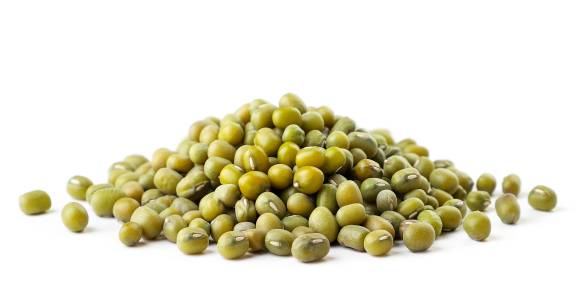Connect with a verified veterinarian in minutes. Licensed vets are available 24/7 to answer your questions. No need to worry about your furry family member.
Many pet parents are switching to a vegetarian diet and choosing to feed their dogs veggies, too! Plant-based diets are trendy these days. One such veggie that’s become popular with humans is mung beans. While mung beans are safe for humans, what about dogs? Can dogs safely eat mung beans?
In this article, we discuss what mung beans are, their nutritional value, and whether they’re safe or not for dogs. Let’s get started!
What are Mung Beans?
Mung beans are small, green legumes that are related to peas and lentils. You may be more familiar with bean sprouts, which are usually sprouted mung beans!
Mung beans have been grown since ancient times. They have a slightly sweet taste and are sold fresh, as sprouts, or dried beans. These beans are not as popular in the US; however, you can find them in health food stores in this country.
The beans can be eaten in salads, soups, stir-fries, and raw sprouts.
These beans are popular in India, but are also enjoyed in North America and other countries. They’re a good source of potassium, folate, copper, magnesium and B vitamins. The beans and sprouts can be eaten cooked or raw.
Mung beans are also low in fat and a great choice for dogs who need to lose weight or maintain a healthy weight.
Can Dogs Eat Mung Beans?
Can my dog eat mung beans? Yes! He can enjoy these beans cooked, raw or even as sprouts! Can my puppy eat mung beans? Yes, but in small amounts.

Review symptoms, medications & behavior to keep your pets healthy with a Vet Online in just minutes.
Ask a Vet Live NowHow Many Mung Beans Can a Dog Eat?
While mung beans can be a healthy part of a dog’s diet, there are some considerations to keep in mind. Most dogs are not used to eating veggies, so it’s a good idea to gradually introduce the beans into your fur baby’s diet in small amounts. After your canine companion eats the beans, observe how he reacts and if he develops any symptoms.
For most dogs, it’s best to keep their daily intake of mung beans to no more than 10% of their daily diet. For instance, if your dog eats 1 cup of food a day, he should eat no more than 1-2 tablespoons of mung beans each day.
Dogs can eat mung beans about once or twice a week, as part of a balanced diet. If you feed your dog mung beans too often, he could develop diarrhea and an upset stomach.
You can add cooked or raw beans to your pup’s regular dog food, or use the sprouts instead. Be aware that the beans may cause your dog to have excess gas. What if my dog ate a large amount of mung beans or sprouts? If your dog has too many beans or sprouts, he could develop tummy trouble, including diarrhea. So be sure to serve these in small amounts once in a while to avoid these issues.
Connect with a verified veterinarian in minutes. Licensed vets are available 24/7 to answer your questions. No need to worry about your furry family member.

Julie
Julie is a graduate of the University of North Carolina, Wilmington, where she studied Animal science. Though contrary to the opinion of her parents she was meant to study pharmacy, but she was in love with animals especially cats. Julie currently works in an animal research institute (NGO) in California and loves spending quality time with her little cat. She has the passion for making research about animals, how they survive, their way of life among others and publishes it. Julie is also happily married with two kids.
Review symptoms, medications & behavior to keep your pets healthy with a Vet Online in just minutes.
Ask a Vet Live Now

